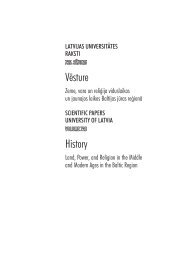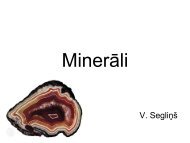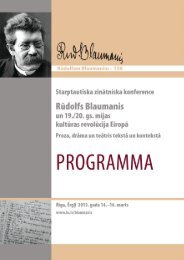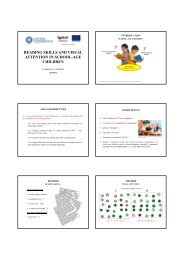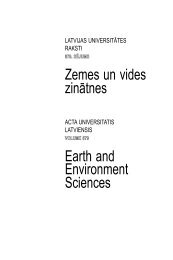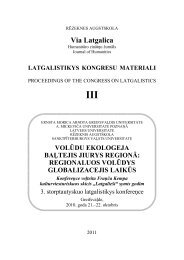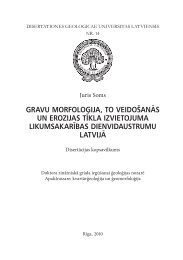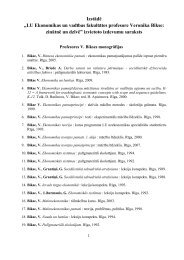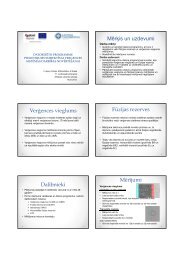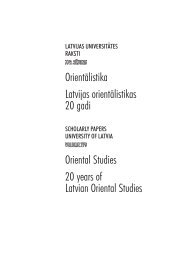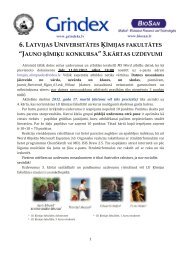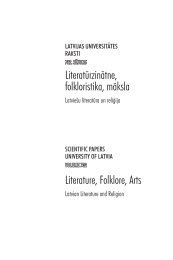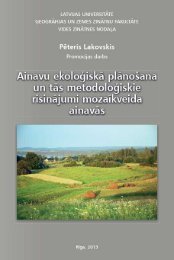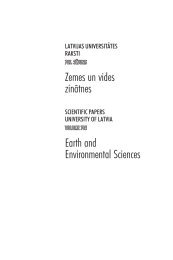Untitled
Untitled
Untitled
Create successful ePaper yourself
Turn your PDF publications into a flip-book with our unique Google optimized e-Paper software.
LATVIJAS UNIVERSITÂTES RAKSTI. 2004. 666. sçj.: LITERATÛRZINÂTNE, FOLKLORISTIKA,<br />
MÂKSLA, 158.–163. lpp.<br />
Bordercrossings in Janice Kulyk–Keefer’s Novel<br />
“Honey and Ashes”<br />
Robeþpârejas Dþenisas Kuïikas–Kîferes românâ<br />
“Medus un pelni”<br />
Edgars Oðiòð (Latvia)<br />
Department of Literature and Culture,<br />
Faculty of Modern Languages, University of Latvia<br />
Visvalza 4a, Riga, LV 1050, Latvia<br />
e–mail: edosin@lanet.lv<br />
The book Honey and Ashes published in 1998 by the Canadian writer of Ukrainian and Polish<br />
origin, literary critic and university professor J.Kulik–Keefer is devoted to the investigation of<br />
a family history and ethnic roots. In order to write a family history the author has not only to<br />
write down the stories of grandparents but also to read books on history, to investigate geography<br />
maps and archive materials. During this process the author has to cross borders between<br />
countries, between the present and the past, the imagination and the reality and to overcome<br />
language barriers. Though the village by the name of Staromisczyna (in translation – the Old<br />
Place) still exists in the place where it has been for hundreds of years everything in it has<br />
changed and there is no possibility to visit the past. Travels in imagination and visits to the<br />
archives in the Ukraine and Poland discover new discrepancies and tragic events in the lives<br />
of people and whole nations which previously have been hidden and not spoken about. Looking<br />
from the transcultural point of view chosen by the author it is impossible to find a clear<br />
cut and unambiguous answers to a large number of questions about the past or the present.<br />
Instead of that it is necessary to try to live without the burden of past wrongdoings and biases<br />
and not to impose one’s views on the future.<br />
Keywords: borders, Ukrainian, Polish, Canadian, past and present, transcultural fictions.Janice<br />
Kulyk Keefer, a second generation immigrant writer, is an outstanding representative of the<br />
so–called hyphenated Canadians – her roots are largely Ukrainian and also Polish. She is the<br />
author of more than ten books – poetry, fiction and criticism (Reading Mavis Galant, Under<br />
Eastern Eyes: A Critical Reading of Canadian Maritime fiction etc.). She is also a professor<br />
of English at Guelph University, Ontario.<br />
The full title of the novel, published in 1998 is Honey and Ashes: A Story of<br />
Family. The author has explored aspects of her Eastern European heritage in other,<br />
earlier writings – a number of short stories, scholarly articles, interviews and her 1996<br />
novel The Green Library. Keefer is also a frequent transatlantic traveller and has visited<br />
many countries of the world. Her fiction is largely written from a transcultural<br />
perspective, bridging different ethnic discourses, past and present, written history and<br />
the oral tradition. Elisabeth Marald in her study of Keefer’s transcultural travels points<br />
out that her fiction it is affirmative rather than nostalgic, “does not hide its less admirable<br />
legacies” and brings into light and interrogates “the prejudices held by one’s<br />
own group” 1<br />
The transcultural topic is also conveyed by Keefer’s literary technique. By means<br />
of different border–crossing structures, the literary discourse proves to be an alternative<br />
means of unmasking cultural assumptions. Spiral narratives, narrative voice,



